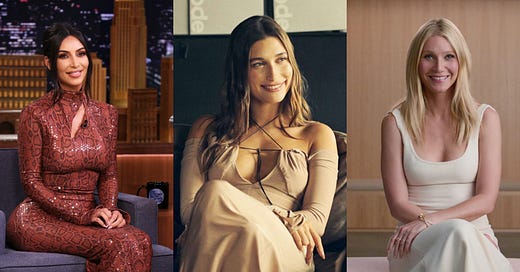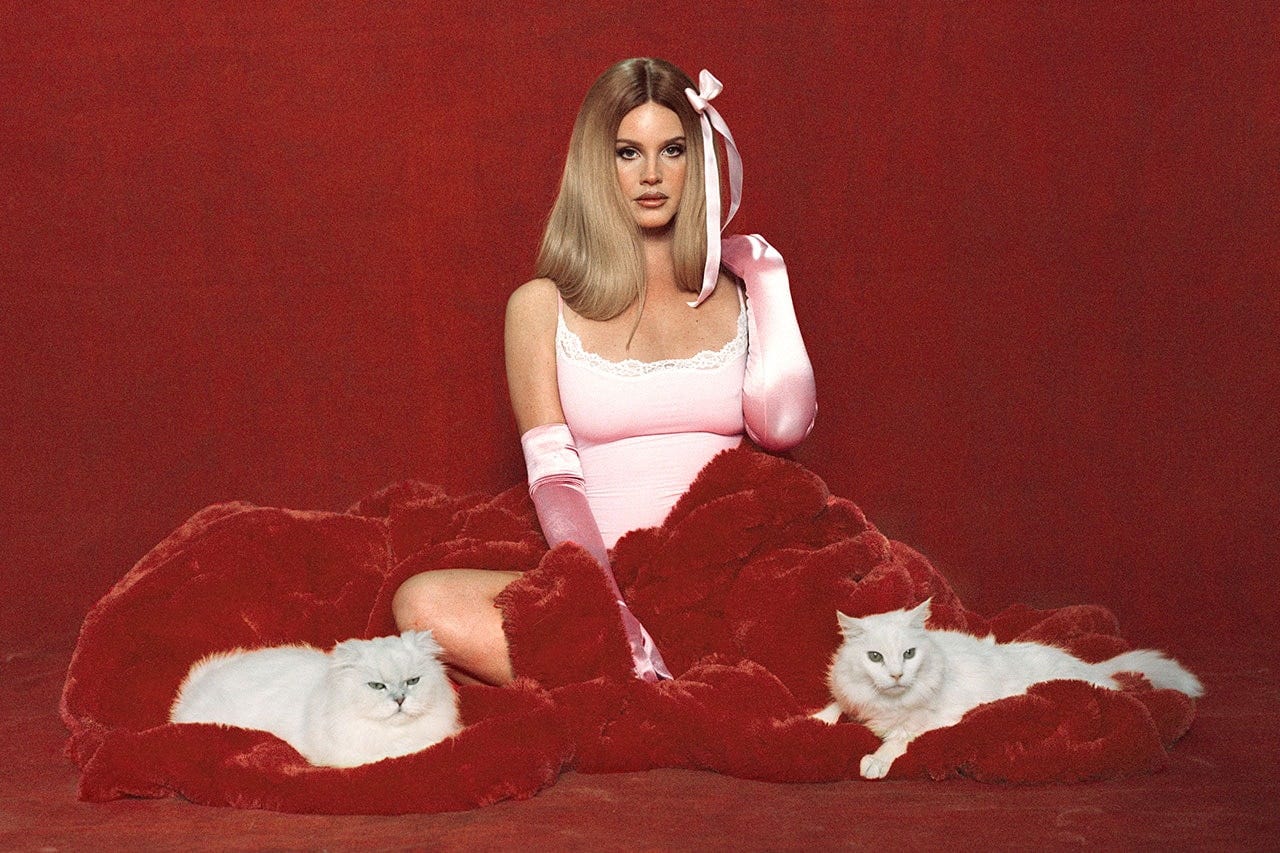3. behind: Rhode, SKIMS and Goop
these are some of my favourite brands that I actually buy from, and yes, they're celebrity-owned. big shock.
Trust me, I understand why people are tired of celebrity brands, but these particular ones stand out for one key reason: they create products that people genuinely want.
Unlike the dwindling excitement for certain other celebrity products, (honestly, who’s still buying Kylie Cosmetic Lip Kits in 2024, and I’ve never actually seen anyone wearing Ivy Park) these brands have managed to stay relevant and in demand.
Everyone’s talking about these lip tints, everyone is wearing SKIMS (or at least knows someone who does) and Goop is no longer just a brand but a lifestyle…
They've succeeded by focusing on what consumers truly value, whether it's the effectiveness of the products, their inclusivity, or the innovative approach to wellness and lifestyle they offer. This consumer-centric approach is what sets them apart in the crowded world of celebrity brands.
Rhode Beauty
From "glazed donut" skin to "vanilla girl" makeup, Hailey Bieber's Rhode Skin has been attached to a slew of recent beauty trends, most significantly the ‘clean girl’. Honestly, the flood of ‘celebeauty’ brands can be overwhelming, so I’m with you on the eye rolls. However, I love love love Rhode Skin and HB’s approach to building a brand.
“I know that people are so tired of celebrity brands and I’m like, honestly, I get that,” she said in an interview with Bustle. “I think that I’m trying to do something very different.”
I truly believe Bieber is on the path of doing things a lot differently than what we’re used to with other ‘celebeauty’ brands. When it launched in June 2022, it wasn't about quantity (cough, Kylie Cosmetics); it was all about quality—"one of everything really good," as the brand put it. Till now, the product range is still pretty tight, with lip tints launching a few months ago and a new cleanser this year. What's clever is how they've kept their inventory somewhat limited. With every new drop, Rhode has generated tons of social media buzz and a subsequent long waitlist.
And it’s this buzz that's made Rhode so popular. FOMO if you wish. People already loved HB, and her fans were borderline obsessed with her skin. Combine her influence, which seems to turn anything into some sort of food-related trend, with a brand that's always on the edge of selling out, and you've got a formula for success. Plus, it doesn't hurt that Rhode always delivers with that clean, minimal aesthetic that pulls you right in.
“I want to be everywhere possible.” Hailey Bieber
SKIMS
Despite its initial challenges (Kimono, anyone?), Kim Kardashian’s SKIMS is now worth $4 billion. It’s true, I'm biased—I have a soft spot for Kim—but there’s no underestimating her capability as a businesswoman.
“It has grown quickly, and we’re so proud of that,” the Kardashian said. “We’ve had a really good flow of product launches.”
As well as launching clothes the girlies (and now guys) actually want to (and do) wear, SKIMS has quite simply mastered collaborations. When a brand is constantly dropping as many collections as SKIMS, it’s easy to become bored (I mean, how many leggings do we need?) However, Kim Kardashian seems to have a sixth sense for cultural trends. With a plethora of star-studded campaigns featuring everyone from football star Neymar Jr. to rapper icon Ice Spice to Snoop Dogg's entire family, SKIMS continues to capture public attention without missing a beat.
These strategic alliances highlight Skims' forward-thinking approach in the domain of brand partnerships. Kardashian's knack for identifying and executing impactful collaborations exemplifies a sophisticated and effective strategy for brand development and market penetration.
Goop
Gwyneth Paltrow's Goop is another successful celebrity brand. Launched as a newsletter back in 2008, it's grown into a massive wellness and beauty empire that's as famous for its jade eggs and unique candle scents as it is for stirring up debate. Goop has its critics, sure, especially when it comes to some of its more... out-there products and health claims. But at its core, Goop is about sparking curiosity, exploring wellness in unconventional ways, and building a community around that.
“We operate from a place of curiosity and nonjudgment, and we start hard conversations, crack open taboos, and look for connection and resonance everywhere we can find it,” the website‘s About page reads.
It's fascinating how Gwyneth has navigated the controversies, maintaining a solid fan base and a strong market presence, with Goop becoming a staple in discussions about celebrity wellness brands. Despite the criticism, or maybe because of it, Goop continues to thrive, proving there's a market for luxury wellness that's a little left-of-centre.
Weekly musings:
Gen-Z and Gen Alpha’s Beauty Behaviours Are Not Trends: As a Gen-Zer myself, it’s always interesting to read articles on why we behave the way we do, or at least why millennials and Gen-Xers think we do. There's an interesting comparison between beauty shopping experiences across generations. Rachel Strugatz suggests that teenagers' desire to engage in beauty and skin care, to experiment with products, and to feel grown-up is a universal and timeless phenomenon, not specific to any one generation. And for the most part, I agree.
Can Amazon Be the Amazon of Luxury? Richard Baker, the chairman of Hudson's Bay Company (HBC), is reportedly trying to persuade Amazon to partner with him as their gateway into luxury retail. Baker previously attempted a similar strategy by integrating Lord & Taylor (a luxury department store) into Walmart’s website, which didn't work out as planned. Amazon has been trying to make a mark in the luxury fashion industry. Despite their efforts, including sponsoring high-profile fashion events, they haven’t been successful in attracting luxury brands to their platform. Would acquiring Net-a-Porter, given its access to luxury goods and Amazon's ability to fix its operational flaws, be a good move?
The Age of Impressionism: The "2024 Voices of Fashion" report by Launchmetrics explains how fashion brands succeed not just by being big or flashy but by understanding their audience. Brands can't be everything to everyone, as it mentions how brands like Alaïa and Mugler are doing well even without huge budgets. Celebrities are impacting brands (Beyoncé's fashion, boosted by stylist Shiona Turini, created a lot of media buzz and value for brands like Balmain), influencers and their weddings are impacting brands (Chanel and Sofia Richie, Dolce & Gabbana and Kourtney Kardashian, Barbara Palvin and Vivienne Westwood), creative directors are impacting brands (Pharrell Williams' appointment at Louis Vuitton generated $616,000 worth of MIV on their own accounts alone) and unexpected collaborations are impacting brands (Prada with NASA or Dolce & Gabbana with Smeg)
Inside the Glam Vs. Clean Girl Beauty Trend Battle: The beauty world is divided between minimalist and maximalist makeup trends, with influencers and brands trying to keep up with or lead the way in these trends. It's a battle between minimal makeup (the "clean girl" look) and heavy, glamorous makeup (like the "mob wife" look). Brands are trying to cater to both trends. Some, like Rare Beauty, are succeeding by appealing to fans of both the clean girl and the glam look. Others, stuck in one style, like Morphe, are struggling.
Kylie Schools Stormi In How To Be A Front Row Star: I read this article early on in the week, and it piqued an interesting thought about celebrity branding and how early on this starts for the kids of said celebrities. Stormi is only five, but it seems Kylie is starting to build her daughter's public image pretty early. It's a smart move in personal branding, blending her private life with her public image. But it also has me questioning the ethics of involving young children in the complex world of fame. Essentially, it's about how celebrities use their influence, not just for themselves but for the next generation too. Good or bad?
Maison Margiela Frees the... Vulva at Couture Week: Maison Margiela's Artisanal Collection 2024, showcased at Paris Couture Week, was a bold and evocative display. The collection was notable for its sultry silhouettes, emphasised by corsets, and a deliberate nod to body empowerment, particularly highlighting body hair, which is often stigmatised. This haute couture presentation, Galliano's first since 2020, was a daring exploration of self-expression and body positivity, marking a significant moment in fashion.
Saie brings community and free makeup to new IRL masterclasses: Saie hosted 180 people for makeup masterclasses. The attendees were a mix of their loyal customers, including top spenders and fans, as well as influencers and press members. The event is part of a series that will also happen in New York, London, and Toronto this year. The event reflects the brand's approach to making makeup accessible and simple for everyday people. Brands can learn from Saie's strategy about the importance of engaging customers through experiential and educational events, fostering a sense of community and belonging, and building brand loyalty and trust.








